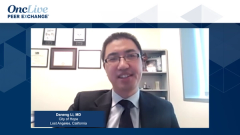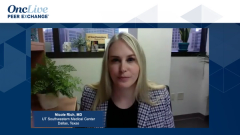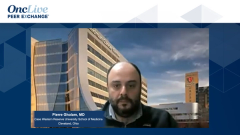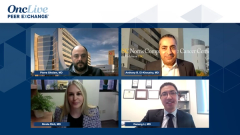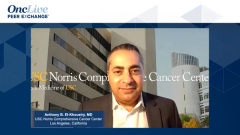
Is There a Role for Single-Agent Immunotherapy in Advanced HCC?
Experts in gastrointestinal cancers, Drs Pierre Gholam and Daneng Li, comment on the role of single-agent immunotherapy for first-line treatment of advanced HCC.
Episodes in this series

Anthony B. El-Khoueiry, MD: Dr Gholam, are there patients in whom you would use single-agent immunotherapy now that durvalumab isn’t inferior to sorafenib and may have a regulatory label? Nivolumab doesn’t have a regulatory label as a single agent. But we have the CheckMate 459 data and the data from durvalumab vs sorafenib in HIMALAYA, which look so similar, with a median OS [overall survival] of 16 months for both and very similar response rates. Is there a role for a single-agent PD-1 inhibitor in a subset of patients?
Pierre Gholam, MD: Yes. It’s a very nuanced answer dependent on experience and context. I looked at the NCCN [National Comprehensive Cancer Network] guidelines that were last updated in September 2021. They’re not 100% up to date. They interestingly note that nivolumab single agent in the first line is useful under certain circumstances. I like this useful under certain circumstances label. I’m not quite sure what that means, but I very much take your point that if you look at cross-study comparisons of raw numbers, especially overall survival, these appear to be similar. Contextually, though, you brought up the very important point of exclusion of patients with main PV [portal vein] thrombosis from the durvalumab-tremelimumab study and from REFLECT, which is important and relevant to the outcome of patients. But in certain contexts, nivolumab monotherapy might make sense. That doesn’t come up very often, as we have more options available to us that are robust and hopefully cover the vast majority of patients.
Anthony B. El-Khoueiry, MD: I agree. I’ve used a single-agent PD-1 in the first line in the frail patients with poor performance status, where I’d be worried about the adverse effects for whichever combination I’m thinking about, or in patients with Child-Pugh B scores, where we have safety data for single-agent PD-1 inhibitors. The durvalumab noninferiority gives me more support in this. That’s the small space where I’ve used that. Dr Li, how have you approached it?
Daneng Li, MD: I concur with what you have proposed in terms of the instances. I agree particularly in our older adult patients, where if they encounter a grade 2 toxicity like diarrhea or even grade 2 liver injury, which we tend to see a little more with CTLA-4 inhibitors, it’s much harder for those patients to potentially recover from those toxicities. They don’t necessarily have to have grade 3 or higher toxicities to have a significant impact on their overall health in terms of their long-term outcomes. For an older adult patient with multiple comorbidities and somewhat borderline performance status, I’d be a little cautious including dual checkpoint inhibitors or combination therapy in that setting due to concerns of what would happen to those patients should they incur a grade 2 or higher toxicity.
Anthony B. El-Khoueiry, MD: What you’re alluding to is when we combine PD-1 with CTLA-4, like tremelimumab-durvalumab, in that combination in HIMALAYA, 20% of patients had immune-mediated events that required steroids. Those are serious enough to require interruption and steroid treatment. With a patient with small reserves, those could be significant. Dr Gholam, did you have a comment or question?
Pierre Gholam, MD: Yes. You answered this to some extent in your comment that you just made. When you add a CTLA-4 inhibitor—you both have extensive expertise in prescribing this—if you look at treatment-related AEs [adverse events] in HIMALAYA, it doesn’t look like it’s dramatically greater with the priming dose, the STRIDE regimen, compared with durvalumab monotherapy. Do you see that in your practice? Is that something that might guide your decision to use monotherapy? The addition of that priming dose, which as I understand is just 1 initial dose, and then you get durvalumab after that?
Anthony B. El-Khoueiry, MD: Yes, but it’s a high-dose priming dose. You hit it right on. Overall, the treatment-related adverse events weren’t very different. But when you look at grade 3 or 4 events that needed interruption or steroid initiation, it was 20% with the combination, and about 8% or 9% with durvalumab alone. There’s a difference there. It’s a physician assessment of how significant that risk is for that individual patient and what reserve they have. Do you want to subject them to that risk?
Transcript Edited for Clarity


